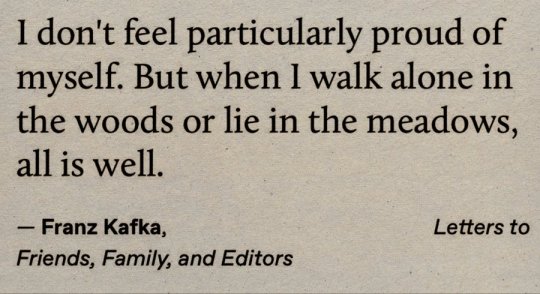Text


solid perfume necklace in the shape of a mussel from estée lauder, 1974
27K notes
·
View notes
Text
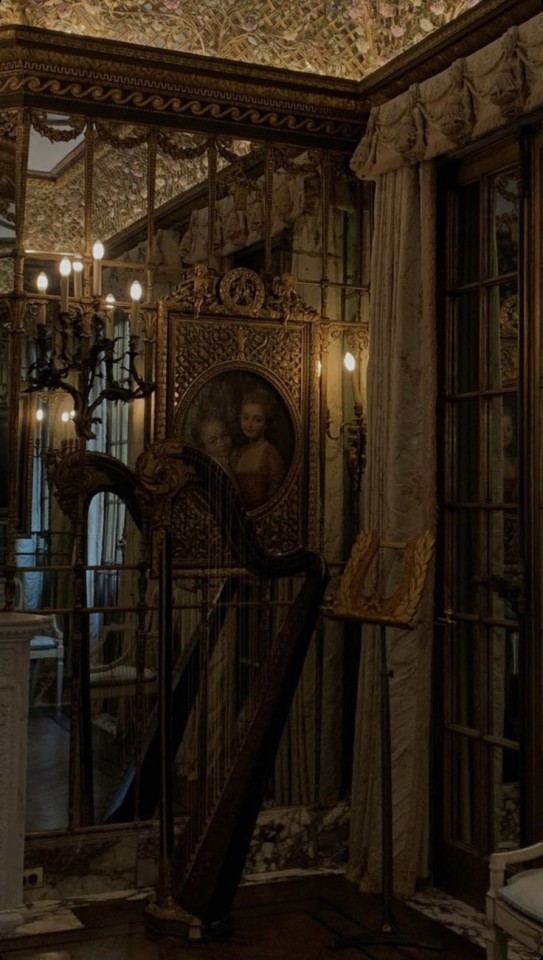



Sometimes, you read a book and it fills you with this weird evangelical zeal, and you become convinced that the shattered world will never be put back together unless and until all living humans read the book.
— John Green.
3K notes
·
View notes
Text
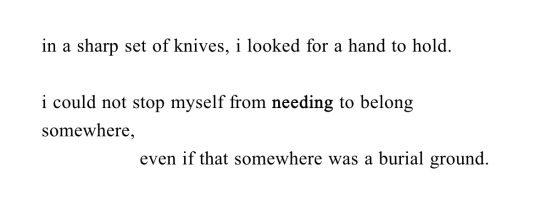
fatima aamer bilal, excerpt from moony moonless sky’s ‘we were put on this earth desperate, hungry and willing.’
[text id: in a sharp set of knives, i looked for a hand to hold. / i could not stop myself from needing to belong somewhere, even if that somewhere was a burial ground.]
4K notes
·
View notes
Text
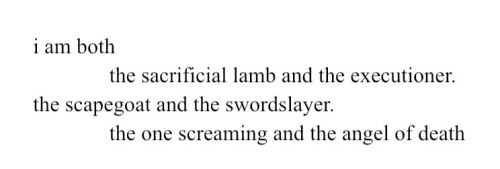
Bilal Al-Shams, Sacrifice
12K notes
·
View notes
Text

— Rainer Maria Rilke, from “I am praying again, Awesome One.”
3K notes
·
View notes
Text
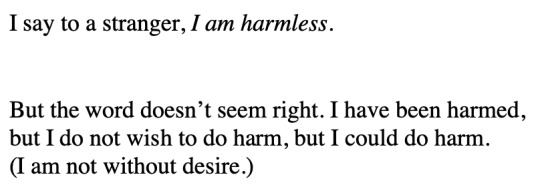
Ada Limón, from "To the Busted Among Us", Sharks in the Rivers
13K notes
·
View notes
Text

— Ilya Kaminsky, “A City Like a Guillotine Shivers on Its Way to the Neck,” from Deaf Republic (via lunamonchtuna)
141 notes
·
View notes
Text
Which OC has frequent nightmares?
165 notes
·
View notes
Text
Why is your OC named what they're named? Is there a different reason in-universe than out-of-universe?
#Scarlet Lost#is named after Scarlet from the Clue game/movie#which I grew up with#since a lot of her interests and childhood revolved around horror and true crime#Flynn Castor#was named after Flynn Rider from Tangled#because I was obsessed with him when I was younger#and wanting to be him felt like a trans guy right of passage#and I chose Castor as his last name as a reference to the constellation/greek myth#since Flynn is a space nerd#Scarlet’s last name is rlly just a reference to how she’s always traveling and doesn’t rlly belong anywhere#I haven’t picked middle names for them yet but I probably will soon#Extraterrestrials
3K notes
·
View notes
Text
What is your OC's astrology sign?
#Dion is a Taurus#Sol is a Gemini/Cancer Cusp#Tempest is a Gemini#Sabrina is a Pisces#Vega is a Virgo#mutiny#Dion Aiza-Barros#Sol Ng#Sabrina Barbeau/Furukawa#Tempest Daiber#Vega Gokhale
125 notes
·
View notes
Text
my writing fundamentally changed forever ten years ago when i realized you could use sentence structure to control people’s heart rates. is this still forbidden knowledge or does everyone know it now
50K notes
·
View notes
Text
writing tips masterpost
hello to my loyal tumblr followers... i am often asked to give writing advice but usually when people ask me this i'm nooooot completely sure what to say despite having a ton of advice to give. it's such a broad question when there are so many different things i can advise on, right? so i thought i'd make a sort of writing advice masterpost where i can compile the tips that i think people specifically in fandoms could benefit the most from hearing, OR that i wish someone had told me when i was still finding my footing as a writer.
hopefully this will be helpful to you. i am putting all of the advice under a read more since this is going to be a long one. let's roll!
✬ paragraph breaks are your friend
the fastest way to get me to stop reading a fic is if i click in and see that there are NO paragraphs made and the entire piece is in a huge block of text. no matter how good your work is, i just can't read it at that point. the giant paragraph makes me get lost, i can't focus on anything... it's a huge no.
the trick is you want your paragraphs to sort of act as a guide for your reader, taking them through the story, keeping them engaged. do not be afraid to do short paragraphs! i can understand wanting to shy away from one or two sentence paragraphs for fear of not having "enough substance" in your work, but the truth is, a thousand short paragraphs is ten times easier to read than a huge block of text.
realistically, you want to have a good amount of variety in your paragraph length. variety is key. readers will notice when your work gets formulaic, and some people will like that, but for others that can turn people away from your work. but don't force it! a paragraph should end at the end of a statement, or if the paragraph is getting too long then cut off the thought and continue in the next paragraph with a transitional phrase.
as a general rule of thumb, you want lines of dialogue by different speakers to be put in separate paragraphs. you also want to avoid doing huge chunks of narration or exposition in the same paragraph as you introduce a new speaker. just make a new paragraph! no big deal. i guarantee you your reader will be way more engaged and nobody is going to come at you for doing more rather than less.
✬ make sure the reader knows who is speaking and when
you don't have to end off every line of dialogue with "she said" and in fact i would really recommend you don't. but you ALWAYS need to have some kind of indication in the text as to who is speaking, otherwise the reader can get lost.
this doesn't necessarily mean that you always have to explicitly say who is saying what, though. if it is obvious in a scene who is saying something -- so for example, a scene where there are only two characters talking OR the dialogue has some kind of phrase, statement, etc that makes it obvious who the speaker is -- then in that case you can just let the dialogue speak for itself. sometimes in writing less can be more. you disrupt the flow of a scene if you start to exposit unnecessarily when the reader could reasonably work something out for themself.
✬ "said" is your friend too
related to the last piece of advice, here's another note: don't shy away from using the word "said".
don't overuse it, either. obviously, you don't want every single line to be "he says" "she says" back and forth, especially when they might be asking questions or shouting, in which case the word "said" probably isn't all that applicable at all. but it's a nice default. if you catch yourself busting out the thesaurus, my recommendation? quit it. just use said. it's not going to hurt you and the reader isn't going to mind.
but yeah, in the event that a character is raising their voice, whispering, inquiring -- there are tons of other words you can use in lieu of said and then an adverb. it's just context-dependent, and also, you don't really want to lean too far one way or another. like i said, variety is key. too much of the same breaks immersion.
✬ if you wouldn't say it yourself, probably don't use it in writing
another related tip. look, i get it. you want to spruce up your writing with synonyms. but the fact of the matter is that a lot of these words that "mean the same thing" on paper actually have wildly differing connotations and if you don't understand what those are you're going to look kind of silly whipping out a word you just found off the internet. we can usually tell, too.
your vocabulary will naturally grow and expand as you continue to read and learn. you don't have to try and force it to seem smarter in your writing. people who can write compelling prose and dialogue without throwing in fancy words they barely understand look a lot more intelligent than people who have a thesaurus at the ready 24/7.
✬ if there's a simpler way to say it, take it
this one can be sort of style-dependent, so if it's not your cup of tea then feel free to take or leave this tip, but in my opinion, taking a whole seven-line paragraph to describe a simple action wastes both your and the readers' time.
how many times have you read a fic where the main characters are having a conversation with these long rambling paragraphs between lines of dialogue? sometimes this makes sense! if you were writing a death note fic it would absolutely make sense for light or L to be pausing every few seconds to carefully analyse their opponent's move... but that's not always the case. sometimes characters are just making small talk.
i'm not saying you can't show off. you should show off where applicable. but there's a time and place. sometimes a scene benefits more from you taking the easy way to describe something and moving on. flowery language is great, but if you're meandering too much the reader will lose interest and attention.
✬ a metaphor is useless if nobody knows what it means
writing is subjective and highly personal. write for yourself first and foremost, and use the metaphors that feel right to you -- but the best metaphorical pieces, to me, are the ones that people can understand and identify with.
you've read a story like that, haven't you? with a reoccurring theme or motif that comes back into play at the end in a way that makes you feel so satisfied and complete? THAT'S what you aim for with literary devices like that. if you write a story that nobody can understand, with metaphors that just don't make any sense -- then you haven't really successfully told a good story, have you?
i understand wanting to have a magnum opus. i think it's easy to fall into the "misunderstood writer" mindset where you want your pieces to be so magnificent that only the likeminded will get it -- but writing is a form of communication. metaphor is just another means with which we can illustrate how we feel. you WANT your readers to understand what you're doing with the metaphors, you WANT the people who step away from your story to know what you were trying to say. you don't have to be obvious, just make it good. make it something that can be reasonably drawn from the text.
at the end of the day flowery language is just flowery language. that doesn't actually make your story good.
✬ grammar intermission
(.) period/full stop: used at the end of sentences. oftentimes not used at the end of sentences in dialogue, because lines of dialogue are considered a fragment of a larger sentence. use a period/full stop at the end of a line of dialogue if the dialogue is followed up by another complete sentence. example:
"i just went to the store," he said, scratching his head.
"i just went to the store." he scratched his head.
(,) comma: used in the middle or to separate different clauses (parts/sections) of sentences. used for incomplete clauses, AKA sections of the sentence that could not function as individual sentences. also used to indicate a slight pause. example:
she reached for the ripest banana, plucking it from the bunch.
a comma can also be replaced by a conjunction like "and" or "but". example:
she reached for the ripest banana and plucked it from the bunch.
(;) semi colon: used to separate different complete clauses in sentences, AKA sections of the sentence that are related but COULD function individually as their own sentences. example:
he sighed as he looked out the window; it had been so long since he stepped outside.
not to be confused with
(:) colon: used at the end of a line that leads into or introduces another line. example:
his fingers drummed restlessly against the window sill. it was finally happening: he was finally leaving this place.
(-) hyphen: used to connect compound words like three-years-old or hyphenated surnames like jones-smith.
(–) en dash: used to indicate ranges of time or distance, like 3–4 hours.
(—) em dash: a girl's best friend. slash j. but an em dash is used to indicate a few different things: an abrupt end to a thought or sentence, a "cut-in" where you interject something tangentially or unrelated before returning to the original thought, or a diversion in the sentence/thought. examples:
"no, listen, you don't understand—"
he scowled—an ugly look on his usually handsome features—and told her to be quiet.
it's not like she had wanted it to go that way—but when had it ever mattered what she wanted?
(()) parentheses: used to add additional context, information, or a semi-unrelated thought that would break the flow of an ongoing sentence without completely taking the reader out. example:
"no, i'm sorry. i just forgot to call you this morning," he said, looking away. (in truth, he'd sat by the phone for fifteen minutes trying to psyche himself into it, but hadn't been able to muster the courage.)
✬ show don't tell, and tell don't show
show don't tell is one of the classic pieces of writing advice that i do, often, think is correct -- but it's a little more nuanced than just never telling your readers what a character is thinking. you want the work to speak for itself without you implanting messages or themes into the reader's brain. at the same time though you don't want them to be doing too much work because it breaks immersion.
this ties into what i was saying above about simpler being better sometimes. you want to be concise especially in scenes that might call for it. a fight scene should be quick and snappy. no need to dig into the physical sensation of being enraged -- just say the character is pissed! but if a character is having a meltdown or panicking, you can get SO much more out of describing how that feels than just outright saying it.
✬ remember your perspective
another huge thing with show don't tell is that you don't want your character to be able to objectively say what everyone else is thinking and feeling -- unless that makes sense for them within the context of the story. really dig into it. DOES the character have a reason to know what their opponents, friends, etc are thinking? how well do they know the other characters? how attentive are they to the emotions of those around them?
it's better to focus on descriptions than labels in that case. say what face a character is making, describe their body language or tone. your character can have impressions, just make it clear that those ARE their impressions. and let your character be wrong! they do not have to be a completely objective source of information.
✬ when it comes to representation, if you aren't confident you can do it well, don't do it at all
i'm one of those people who's kind of of the opinion that white or cishet or otherwise systemically advantaged people have no place being the loudest voices in conversations about representation, least of all AS the representatives. if you are someone with systemic privilege and you choose to portray someone who is oppressed -- that's not necessarily a bad thing. but you need to be willing to do your research and have a sensitivity reader, and you have to be ready for people to say you did it wrong.
not much else to be said about that. your voice on the matter isn't actually all that important. there are people from the demographics involved who DO have stories to tell about themselves that will be MUCH more valuable than your perception of them, so it's honestly better to just let them tell it. that's how i feel.
✬ don't break the rules unless you know how to follow them. in other words, your rebellion should be obvious
a lot of times i see people breaking grammar or other rules and citing "stylistic" choices as their reasons why. which is all good and well, to an extent -- but you want it to be very clear that you ARE breaking the rules on purpose in a way that adds to the artistic merit of your piece.
if you don't know the rules, then it really just comes across like messy work. you both have to know how to apply the rules, and also how to break them in a stylistically significant way. if it doesn't make sense for the rules to be broken, if it says nothing... it's honestly better to just follow them. that's my take.
✬ don't be scared of names and pronouns
i said before that you want variety in your work, and that is very very true -- but it's also true that certain words like names, pronouns, etc will sort of blend into the background in writing. people don't notice them. that means if you're using a name or pronoun a lot in a scene to make it clear who exactly is being referred to...
hey. look into my eyes. breathe. it's okay. you do not have to resort to highlighting arbitrary characteristics of the characters. i know. just breathe. it's okay. use their names. they have them for a reason. it's all good.
this isn't to say that you SHOULDN'T do that, just do it when it makes sense to. if height is something the characters are noticing then use "the shorter boy". if age is relevant, eye colour, hair colour, whatever -- go ahead and use them. but don't be excessive with it. i should not be having to read the bluenette more than i'm reading shuichi's actual goddamn name.
✬ read
this is the huge one. reading other works informs your writing. it teaches you skills and tricks you can use. it helps expand your dialogue and your world view. it might even highlight to you things you do too much of in your own writing. read, all the time, whenever you can. it doesn't have to be books. it can be fanfic, articles, whatever -- just keep reading, because you will be passively absorbing knowledge during that time and it'll help you grow as a writer.
✬ practice
BOOOOOO TOMATO TOMATO TOMATO! SHE SAID THE THING SHE SAID IT!
but listen, it's literally just true. i write almost every day for at least a couple of hours and i have been on a trend of consistent growth for the past five years. go read my fics from 2019 if you don't believe me. i've grown fast and i've grown constantly. you just DO grow through constant practice, even if it doesn't always seem that way.
not only that, but you start to build confidence too. writing a lot helps develop those muscles to a point where you start to realise that you ARE that good and you DO have that dawg in you. or whatever. you just have to keep at it. you're not going to magically improve thinking for six months about how you want to be a better writer without practicing anything about it.
✬ yeah, betas are good
you want to have a good editor. i know that that can feel like having someone ELSE be the reason your piece is good, but that's genuinely not it. a beta reader is a second pair of eyes on your work, someone who can tell you about the issues and mistakes you're missing. they'll tell you when something doesn't make sense. they'll point out your punctuation errors. you don't NEED to have a good editor for every crummy little oneshot... but it's good to have one.
✬ numbers are fine and all but don't compare yourself to other people
i think almost everyone in some kind of creative pursuit wants to get some kind of acknowledgement for it. we want to be the best we can be, and it can be discouraging to receive utterly no validation along the way! i get it!!
just don't get caught up in crunching the numbers. you are not as good as your fanbase is. you alone know your skillset and you absolutely should not say "well this other writer got THIS much attention" because that'll just wear you down. it really will. external validation will only keep you going for so long, and you'll always end up needing more. you HAVE to build your own personal confidence first or you'll crash and burn.
✬ read your writing out loud
there is no quicker way to see if something is wonky in your prose than reading it out loud and seeing if it makes sense verbally. i highly recommend this to anybody who struggles with sentence flow. it's a good one.
✬ yippee hooray!
🥰 and that's what i've got for now. thank you if you made it this far, please take all these tips as you will, it is all subjective of course, these are just the tips that help Me the most when i sit down to write something.
please feel free to ask me for additional advice (on specific topics if you could!) at any time, i love encouraging new writers and i am passionate about writing so i will gladly offer support in any way i can, including beta reading works for anybody who might need that.
take care now 💖
265 notes
·
View notes
Text
reminder to worldbuilders: don't get caught up in things that aren't important to the story you're writing, like plot and characters! instead, try to focus on what readers actually care about: detailed plate tectonics
120K notes
·
View notes
Text
Character Interview: Dion Aiza-Barros
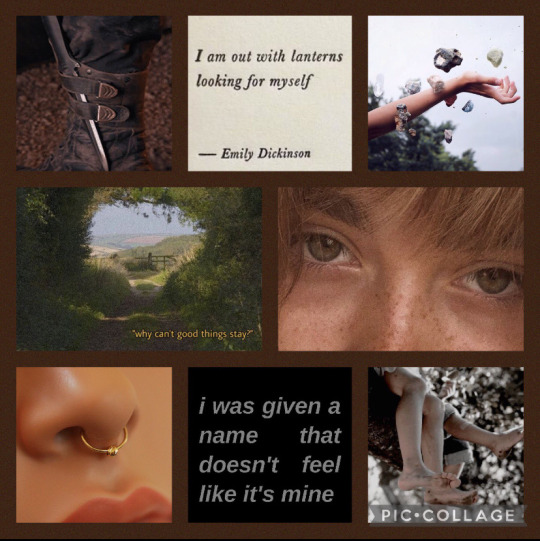
Story: Mutiny
POV/Main/Side/Background Character?: POV/Main Character
Full Name: Dion Aiza-Barros
Age: 13 (at start of story)
Power(s): Mineral Manipulation
Birthday: ML-16 (May 16th) ♉️
Pronouns: He/Him
Identity: Trans Guy, Gay, Poly(?)
Playlist: https://open.spotify.com/playlist/1MxJwir2JK1arMGqgm1TYJ?si=GVvb0zLwRpG-_pVED_I0jQ&pi=u-CWfy_nfwR7e6
Full Interview Below The Cut!
What’s Your Most Prized Possession?: “I only get to pick one? My dagger, maybe? It was a gift from Flint; he always has the best weapons. Is that my most prized, though? My septum ring is probably the most valuable thing I own. Not the most expensive, not by a long shot, but I think everyone in Runadar would say their septum ring. This question is mean- how am I supposed to only pick one thing?”
If you could go anywhere, where would you go and why?: “I don’t know. I’ve never even thought about leaving Runadar. I don’t know very much about the other nations either—Peri says they talked about in school but I must have missed it. I guess Hoiden? Flint’s Mom was from there. Er- unless that’s the place with a bunch of books.”
What’s your biggest fear?: “Fear? Are you kidding? I’m not afraid of anything! If you don’t believe me wait until you hear about all the adventures I’ve gone on! I’m not weak enough to be scared. Don’t believe whatever Flint tells you, he’s just mad he’s not as strong as me.”
If you were granted 3 wishes for whatever you wanted, what would you wish for?: “Ooo! We play this game all the time in Runadar. More jewelry, maybe? No, wait, I can just make that! Nice clothes? That might be a waste of a wish… If I really think about it, I guess I would wish that I wasn’t sick anymore. Maybe then everyone would stop treating me like I’m fragile. Other than that… I don’t know! Everything I think to say I second guess. There’s just too much I could wish for!”
What do you think of The Eye?: “I know I’m not supposed to say this, since they’re here to protect everyone or whatever, but I don’t really like them. Gran used to tell me they’re a bunch of bullies and I need to avoid them at all costs. I’m think they’re why she went missing in the first place, though my parents won’t tell me. Flint has told me how they treat the people in the Outer Sectors too. I just… don’t trust them.”
0 notes
